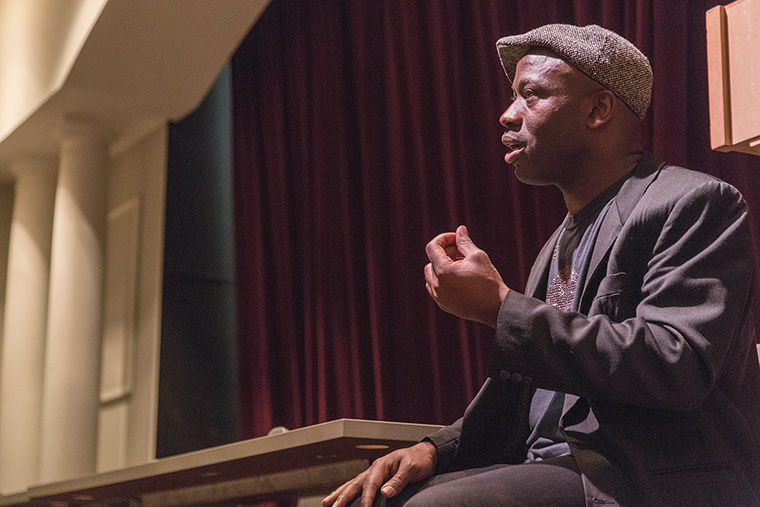Napoleon Maddox leads beatbox symposium for creatives
World-renowned beatboxer Napoleon Maddox spoke to students about the importance of knowing the historical origins of their chosen craft during a beatboxing workshop he led as part of the Black Vocality II Symposium hosted by Columbia’s Center for Black Music Research.
November 24, 2014
The Black Vocality II symposium, hosted by the Center for Black Music Research at Columbia, held Nov. 18–19 at the Music Center, 1014 S. Michigan Ave., featured live performance art and conversation from artists who were excited to demonstrate their craft for attending students to analyze.
The two-day series featured guest speakers discussing the history and evolution of black music. Professionals also took the chance to share their real-life experiences and insight into their craft. Students had the chance to perform in the “Channeling Nina” presentation Nov. 19, a tribute to jazz legend Nina Simone, in which students sang her greatest hits in remembrance.
Napoleon Maddox, world-renowned beatboxer and member of hip-hop group ISWHAT?!, was a guest speaker at the beatboxing workshop and said he was excited to share his knowledge of the craft with students.
“Events like these are paramount,” Maddox said. “It’s something that has to happen. We need people in our society that are willing to teach and share at all costs.”
Maddox urged students in attendance to focus on having a keener understanding of the history behind their passions to help them take unconventional approaches to demonstrate their skill.
“Identify the thing that it is you love and make that thing the thing that you live,” Maddox said. “That way you will never have a job, you will always have a passion [that] won’t be based on [having] a job. That way you will always be living. Find a mentor that can tell you something you don’t know and surround yourself by other like-minded, smarter people and commit yourself on a daily basis to keep making progress in what it is that you love.”
Maddox said though beatboxing is heavily based on a person’s skill in imitating percussive sounds, the art form requires an understanding of its historical implications. He added that beatboxing was one of the four fundamental principles of the hip-hop culture, which also includes breakdancing and graffiti, and that should not to be forgotten.
Katrina Thompson, an associate professor in the Department of History and African American Studies at Saint Louis University, was invited to the symposium, after her book, “Ring, Shout, Wheel About: The Racial Politics of Music and Dance in North American Slavery,” was released in January. She said she enjoyed the opportunity to speak to students about the importance of having a thorough understanding of the roots of their craft and how they may or may not have translated that into the culture.
“If you ever want to know what’s going on historically, socially, politically [or] economically, listen to the music of any time period,” Thompson said. “It’s like a history lesson.”
Thompson, a hip-hop fan herself, said she thinks it is vital for students to be offered these events where the historical context of the sounds and trends heard in today’s hip-hop music can be discussed openly among the future curators of the genre.
“[Y]ou have this very strong history, and you need to respect it,” Thompson said.
Thompson spoke about the need for educators and professionals to reintroduce the principles of holding one’s craft to a higher standard from its origins to its progression in the present. She commended Maddox for effectively doing so during the symposium.
“Napoleon Maddox, as part of the symposium and workshop, put beatboxing in its proper place historically and socially in its musical genre of hip-hop,” Thompson said.
Justin Zullo, a graduate student at Northwestern University and beatboxer, said he was interested in the event because it allowed him to cultivate skills that will separate him from the commercialized beatbox performers popularized by the media. He said he values effectively knowing the foundations of his art and using them in his performance.
Zullo said this event shows the need for reestablishing historical practices, not just within beatboxing or hip-hop, but also within other art forms that have strayed from their initial style and purpose.
“There’s a sort of detachment of the body from the voice,” Zullo said. “All the sort of African-American historical roots that undergird those black cultural expressions have detached from the way they have manifested in the contemporary moment, and something like this awakens that.”








